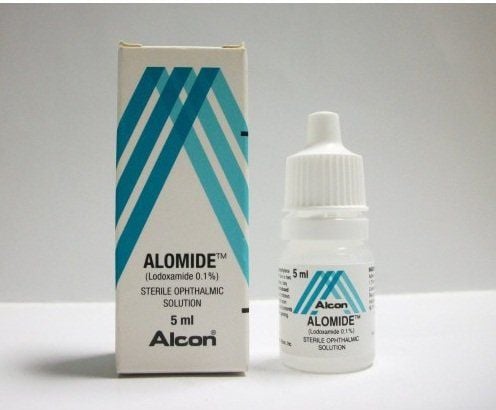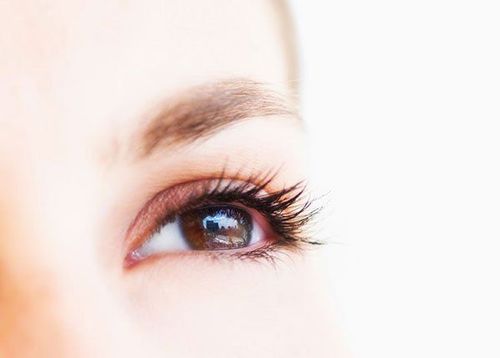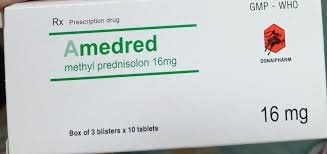This is an automatically translated article.
Albalon is usually indicated for the temporary relief of symptoms of redness and mild discomfort in the eyes. During the use of Albalon, patients need to follow the dosage and frequency of taking the drug to ensure safety and minimize the risk of experiencing side effects.
1. What is Albalon?
Albalon is used for the eyes, providing temporary relief of mild symptoms of eye discomfort or redness caused by irritants. The drug contains the active ingredient naphazoline, which is known to be a vasoconstrictor, which works by narrowing swollen blood vessels in the eye, thereby reducing redness. In addition, Albalon is also used for a number of other therapeutic purposes not listed in this guide.
2. Some things to note before using Albalon thuốc
Before using Albalon eye medicine, patients should note a few important things below:
Avoid using Albalon if you are allergic to naphazoline or have narrow-angle glaucoma. . Talk to your doctor before use if you have a medical condition such as diabetes, heart disease, high blood pressure, thyroid disorder, eye injury or infection. According to the FDA's recommendation for pregnancy category C, there is not yet any information to show that Albalon harms an unborn baby. Ideally, you should tell your doctor if you are pregnant or intend to become pregnant in the near future before use. There are no specific data on whether naphazoline ophthalmic may pass into breast milk and harm a nursing baby, so nursing mothers should consult with their doctor about the benefits and risks of albalone first. when using.
3. How should Albalon be used?
During treatment with Albalon, patients need to use exactly as directed on the drug label or as directed by a doctor. Avoid taking too little medicine, in large amounts, or for longer than the recommended time. Using Albalon for a long time or too often can worsen symptoms as well as damage the blood vessels in the eye.
In order to use Albalon medicine properly and achieve optimal effect, patients need to adhere to a few things below:
Wash hands before instilling eye drops When instilling the medicine, tilt your head slightly back and pull your eyelids. downward, then point the tip of the dropper to the corner of the eye and place 1-2 drops. After instillation, close your eyes and gently press your finger against the inner corner of the eye for about 60 seconds so that the solution does not flow into the tear ducts. Eye drops with Albalon should only be used in the recommended number of drops. During instillation of Albalon, the tip of the face dropper should be avoided in direct contact with the eyes or hands. This can contaminate the dropper and cause eye infections and even other serious vision problems.
Besides, patients need to pay attention to the color and texture of Albalon. If the solution in the vial has changed color or contains particles inside, it is best to stop taking the medicine.
4. What to do if you miss a dose or overdose on Albalon?
Because the drug albalon is used in case of need, so there is no definite schedule. If you are advised to take your medicine at fixed times of the day and miss a dose, take it as soon as you remember. However, the missed dose should be skipped if it is almost time for the next dose in the series. Absolutely do not use more medicine to make up for the dose.
For Albalon overdose cases, although there are currently no specific reports of overdose symptoms, some patients may experience an allergic reaction to the active ingredient naphazoline after instillation. If you experience any suspicious symptoms after taking an overdose of Albalon, tell your doctor or seek medical help as soon as possible.
5. Some side effects of the drug Albalon
Albalon may cause some side effects during use, including:
Allergic reactions, such as difficulty breathing, rash, swelling of the tongue, throat, face and lips. Eye pain or redness persists or gets worse. There are changes in vision, such as blurred vision. Fast heart rate, irregular heartbeat, chest pain. Severe headache with ringing in the ears, confusion, anxiety, or trouble breathing. Spicy or mild burning sensation in the eyes. Weep. Dizzy . Nervous. Side effects of Albalon may not be the same for each patient. If you notice any of the above-mentioned symptoms in your body, you should stop using albalon and tell your doctor right away for action.
6. Some things to be careful about when using Albalon
When treating red eyes with Albalon, patients need to be careful about the following:
Albalon only works to temporarily reduce mild redness or discomfort in the eyes caused by minor irritants cause. Do not use albalon if you have narrow-angle glaucoma. Stop using Albalon and tell your doctor right away if eye redness does not improve or becomes worse, accompanied by other conditions such as eye pain, dizziness, vision changes, headache, trouble breathing or severe tinnitus. Avoid using albalon while wearing contact lenses because it contains a preservative that can easily change the color of soft contact lenses. Patients should wait at least 15 minutes after taking albalon before wearing contact lenses.
7. Instructions for storing Albalon drugs
Albalon medicine should be stored in a dry place, not exceeding 30 degrees Celsius and protected from direct light. Medicines should be placed in a high place, out of reach of small children and minimize contact with family pets. In addition, you must not share albalon with other people and should only use it when prescribed by your doctor.
Hope with the sharing of Albalon drug will help the process of using the drug in patients most effectively and safely.
Please dial HOTLINE for more information or register for an appointment HERE. Download MyVinmec app to make appointments faster and to manage your bookings easily.
Reference source: drugs.com - holevn.org












